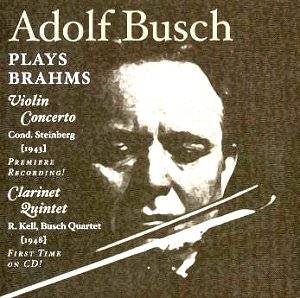In his notes Tully Potter speculates that there may
have been external reasons for the relative speed of this previously
unissued performance of Buschís Brahms Concerto but itís really barely
faster than, say, Erica Moriniís similarly live traversal in New York
with the same orchestra and George Szell nearly ten years later. We
are indeed fortunate to have this performance and to be able to contrast
it with the sprightly live recording of the finale that has circulated
amongst collectors for years and the valedictory 1951 performance of
the complete work with Hans Münch in Basel. That was Buschís last
ever performance. He died the following year and it was two minutes
slower and eight years later than this vibrant 1943 performance. In
the circumstances the discrepancy in timings seems quite explicable.
The first movement is fast though surely not unconscionably
so though Busch rushes a couple of bars early on either out of perceived
haste or technical limitation. But he plays with enviable colouristic
sagacity, using contrasts and shadings, utilising the right hand to
good effect. There is a constant sense of dynamic anticipation in the
performance, aided by Steinbergís volatile directionality. There are
imperfections itís true but these are passing heat-of-the-moment things
and add to the sense of communing realism (Iím thinking of the patch
of very rough bowing from about 10.00 onwards in particular). Though
in quick passagework he comes under pressure in the main he is an enviably
acute exponent of a work with which he was much associated Ė and he
plays his own cadenza. He exhibits some very quick and expressive portamenti
in the second movement at a generally fast tempo but one which is well
and quite movingly sustained with a deal of eloquence. His finale isnít
quite as lavishly exultant as the long semi-available live performance
- this one is slightly too over-emphatic at times but the strongly personalized
New York woodwinds more than make their presence felt.
The Clarinet Concerto derives from a New York concert
given for the New Friends of Music in 1948. By now all five players,
the Busch Quartet members and Reginald Kell were living in America (Kell
had only recently arrived and this was his local debut). Their recording
of the Brahms Quintet of 1937 was a glorious one of course and this
live performance is a delightful adjunct to it, though one reflecting
a generally unchanged sensibility. The first movement is very slightly
quicker in the live performance but itís the Adagio in which one detects
a distinct directional pull in the live performance Ė it takes nearly
two minutes off the commercial disc of nearly a decade earlier. The
other two movements are broadly the same, though predictably very slightly
tighter in live concert (a matter of seconds). The unison subject material
in the first movement is splendidly done, as is the counterpoint if
sometimes there is a slight muddle in the inner voicings of the quartet.
I admired the expressive string passages in the Adagio, the impressive
string colouration (the Quartet incidentally now composed Busch-Straumann-Gottesmann-Busch)
and Kellís handling of the piu lento section, full of passion
with its analogues in Hungarian dance music. The lead back to the opening
phrases is raptly done. Lyrical intensity is properly maintained in
the Andantino and the variations in the finale unfold with seamless
affection Ė with Adolf Buschís vibrato intensifying in his exchanges
with Kell.
The transfers sound excellent. As to whether this thrusting
and propulsive Concerto performance or the more withdrawn and introspective
1951 was more consonant with Buschís idealised conception of the work
I canít say. Iím glad to have heard both.
Jonathan Woolf

